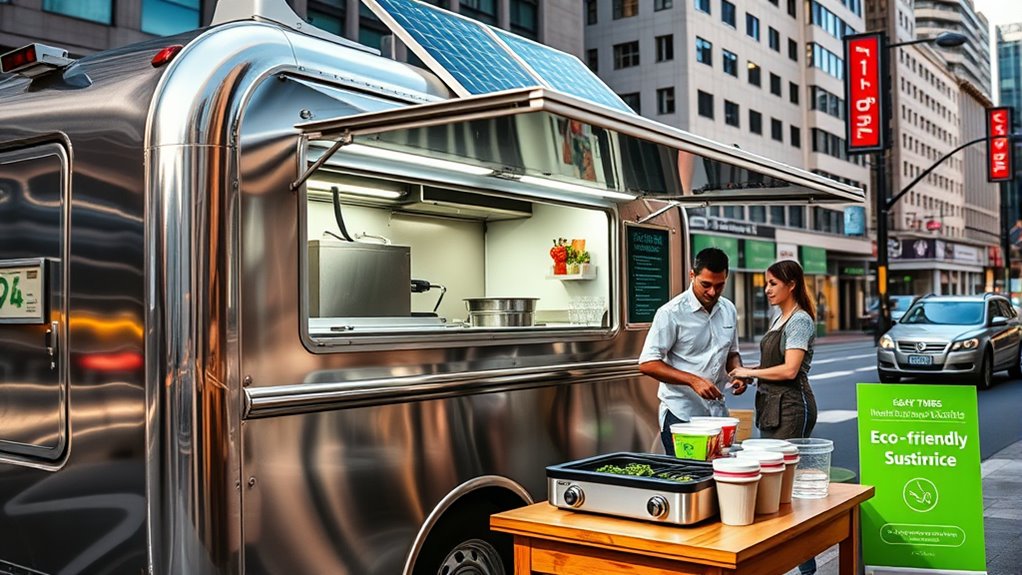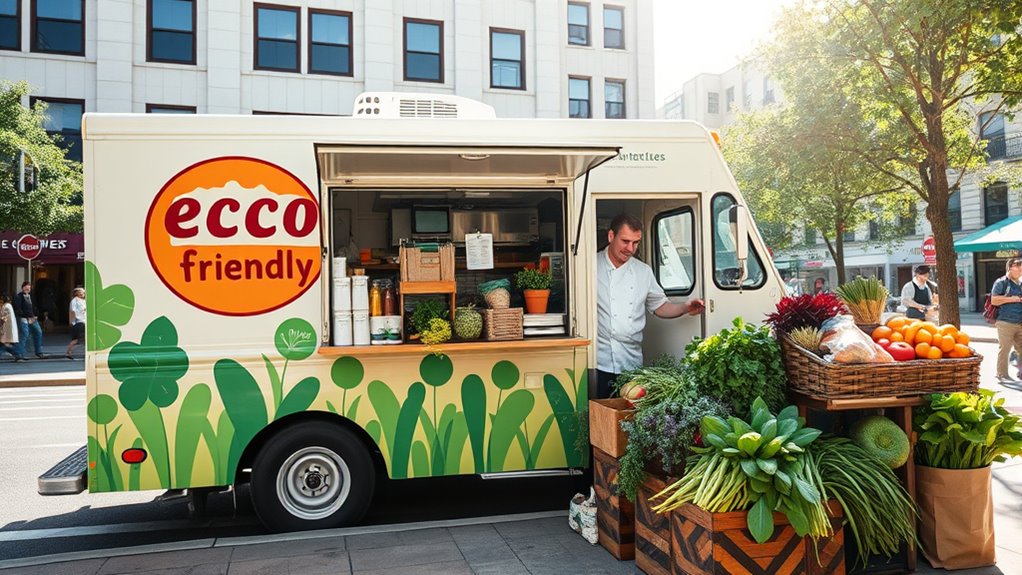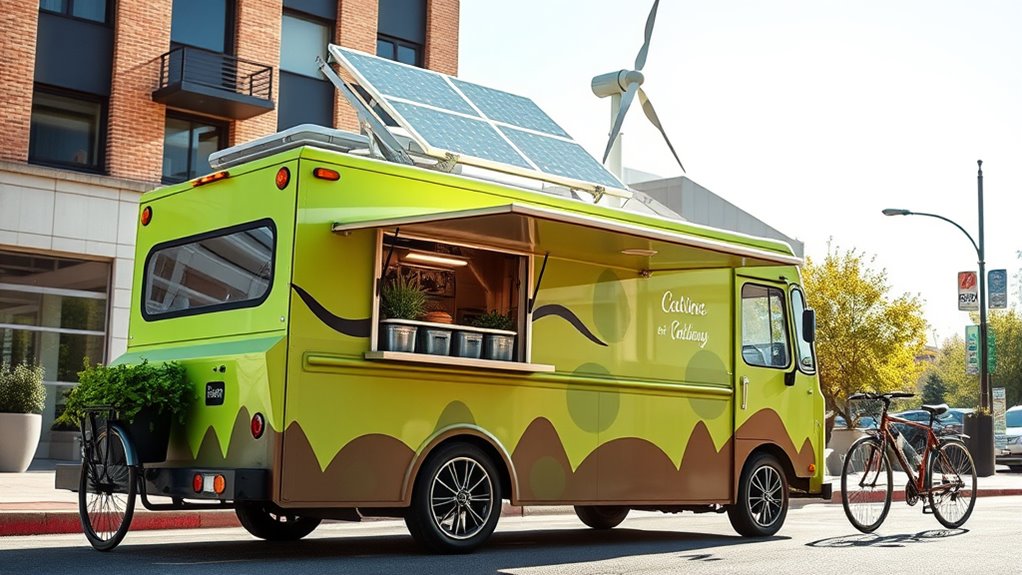To make your food truck more sustainable, start with eco-friendly packaging and utensils, encouraging customers to reuse or offering washable options. Use energy-efficient appliances and install solar power to cut down on electricity. Manage inventory carefully to reduce food waste, source ingredients locally and organically, and implement water-saving fixtures. Promote recycling and composting, and educate staff and customers on sustainable practices. Keep exploring these strategies to boost your eco-friendly efforts even further.
Key Takeaways
- Use biodegradable containers and encourage reusable utensils to minimize landfill waste.
- Source ingredients locally and organically to reduce transportation emissions and support sustainability.
- Install energy-efficient appliances and solar panels to lower energy consumption and carbon footprint.
- Implement water-saving fixtures and rainwater harvesting for efficient water use.
- Organize waste with recycling and composting programs to reduce environmental impact.
Using Eco-Friendly Packaging and Utensils

Switching to eco-friendly packaging and utensils is one of the simplest ways food trucks can diminish their environmental impact. Using biodegradable packaging guarantees that waste breaks down naturally, minimizing landfill accumulation and pollution. Opt for containers made from compostable materials like cornstarch or paper, which are better for the environment and appeal to eco-conscious customers. Reusable utensils are another effective step; encouraging customers to bring their own or offering washable options reduces single-use plastic waste. These small changes demonstrate your commitment to sustainability and can set your food truck apart. Plus, they often cost less over time and foster positive relationships with environmentally aware patrons. By making these adjustments, you actively contribute to a cleaner planet while maintaining efficient, eco-friendly operations. Incorporating performance cookies to analyze the effectiveness of your eco-friendly initiatives can help you continually improve your sustainability efforts.
Incorporating Energy-Efficient Appliances

Choosing eco-friendly appliances helps cut down your energy use and lowers your environmental impact. By reducing power consumption, you save costs and support sustainability. Investing in modern technology guarantees your food truck runs efficiently while staying eco-conscious. Additionally, selecting appliances with energy-efficient features can further optimize performance and reduce long-term operational costs.
Selecting Eco-Friendly Appliances
Incorporating energy-efficient appliances is essential for making your food truck more sustainable and cost-effective. When selecting appliances, look for models that use less energy, such as refrigerators with high energy star ratings. Consider installing solar panels to power your equipment, reducing reliance on grid electricity and lowering your carbon footprint. Choose appliances made from biodegradable materials whenever possible, which minimizes environmental impact and promotes sustainability. Compact, multi-functional appliances can also reduce energy use and save space. Avoid outdated or inefficient equipment that consumes excessive power. Being aware of WWE Raw’s financial impact can inspire you to make strategic investments that enhance your business’s profitability and sustainability. By carefully choosing eco-friendly appliances, you not only cut costs but also demonstrate your commitment to environmental responsibility, attracting eco-conscious customers and strengthening your brand’s sustainability efforts.
Reducing Power Consumption
To effectively reduce power consumption in your food truck, prioritize using energy-efficient appliances that consume less electricity during operation. Upgrading to LED lighting and ENERGY STAR-rated equipment can substantially cut energy use. Conduct regular energy audits to identify areas where power is wasted and target improvements. Consider integrating solar power systems to harness renewable energy and offset your electricity needs, lowering reliance on the grid. Solar panels can provide a sustainable, cost-effective way to power refrigeration, lighting, and small appliances. By combining energy-efficient appliances with solar power and regular energy audits, you optimize your truck’s energy use, reduce operational costs, and minimize your environmental impact. These practices help you operate more sustainably while maintaining excellent service for your customers. Additionally, understanding performance metrics can help monitor your energy savings and identify further opportunities for efficiency improvements.
Investing in Modern Technology
Investing in modern technology can substantially boost your food truck’s energy efficiency. Incorporating a smart grid system allows you to monitor and manage energy use in real time, reducing waste and lowering costs. These systems automatically adjust power distribution based on demand, ensuring appliances operate efficiently without overusing energy. Additionally, upgrading to energy-efficient appliances, like LED lighting and smart refrigeration units, makes a noticeable difference. Automated diagnostics further enhance efficiency by providing instant alerts when equipment needs maintenance or repairs, preventing energy-draining malfunctions. Regular system checks and refrigeration cycle maintenance can further improve performance and prolong equipment lifespan. By embracing these innovations, you not only cut down on energy consumption but also improve your truck’s overall sustainability. Modern technology helps you stay ahead, reduce operational costs, and demonstrate your commitment to eco-friendly practices.
Minimizing Food Waste Through Proper Inventory Management

Effective inventory management is crucial for reducing food waste in food trucks. You can achieve this by implementing accurate inventory tracking systems, which help you keep real-time tabs on stock levels. Regularly monitoring expiration dates ensures that perishable items are used before they spoil, preventing unnecessary waste. Prioritize organizing your ingredients so that older stock is used first, minimizing spoilage. Keep detailed records of deliveries and sales to forecast demand better and adjust orders accordingly. Additionally, incorporating Kia Tuning techniques such as ECU remapping can improve vehicle efficiency, indirectly supporting your sustainability efforts by reducing fuel consumption and emissions. By staying attentive to inventory tracking and expiration monitoring, you reduce over-purchasing and discard less food. This not only saves money but also aligns with sustainable practices, making your food truck more eco-friendly and efficient. Proper inventory management is a simple yet powerful step toward minimizing food waste.
Sourcing Ingredients Sustainably

You can make a big impact by sourcing ingredients from local and organic farms, diminishing your carbon footprint. Choosing these options often means less packaging and waste, helping you cut down on food waste too. Prioritizing sustainable sources guarantees your food truck stays eco-friendly and community-focused. Additionally, supporting sustainable farming practices can promote environmental conservation and encourage responsible agriculture in your area.
Local and Organic Sources
Choosing local and organic sources for your food truck not only supports nearby farmers but also reduces the environmental impact of transportation. By prioritizing farm to table sourcing, you guarantee ingredients are fresh and sustainably produced. When sourcing organic, look for certification processes that verify the products meet strict standards for chemical use and environmental impact. These certifications give your customers confidence in your commitment to quality and sustainability. Local and organic ingredients often require less packaging and transportation, further lowering your ecological footprint. Integrating these sources into your menu can differentiate you from competitors and appeal to eco-conscious consumers. Remember, building relationships with local farmers and understanding their practices helps you maintain a reliable supply of fresh, organic ingredients aligned with your sustainability goals. Additionally, choosing eco-friendly practices in packaging and waste management can enhance your overall sustainability efforts.
Reducing Food Waste
To truly practice sustainability, reducing food waste is essential, as it minimizes the environmental impact of excess ingredients and discarded food. You can achieve this by implementing strategies like proper inventory management to avoid overstocking and using leftovers creatively. Consider partnering with local food donation programs to redirect surplus food to those in need, reducing waste and supporting the community. Additionally, establishing composting programs helps break down organic waste, returning nutrients to the soil and reducing landfill contributions. Using proper storage techniques can also extend the freshness of ingredients and prevent spoilage. Some practical steps include: – Tracking inventory closely to prevent spoilage – Donating excess food to local charities – Composting scraps and peelings for sustainable disposal
Implementing Water Conservation Measures

Implementing water conservation measures is essential for making food trucks more sustainable and reducing operational costs. Start by installing water-efficient fixtures, such as low-flow faucets and spray heads, to minimize water use without sacrificing performance. Consider setting up rainwater harvesting systems to collect and reuse rainwater for cleaning and other non-potable tasks, decreasing reliance on municipal water sources. Educate your staff on best practices for water conservation, like turning off taps when not in use and reporting leaks promptly. Regular maintenance of fixtures ensures they operate efficiently. These steps can notably cut water consumption, lower utility bills, and reduce your environmental footprint. By adopting these measures, you support sustainability and improve your food truck’s overall efficiency.
Utilizing Renewable Energy Sources

After optimizing water use, focusing on renewable energy sources can further reduce your food truck’s environmental impact. Installing solar panels is a smart move, as they harness sunlight to generate clean electricity, powering appliances and lighting. You might also consider wind turbines if your location experiences consistent wind, providing an additional energy source. These options can help cut down on fuel consumption and reliance on fossil fuels. To make it easier, here are some ideas:
- Install solar panels on your roof for cost-effective, sustainable energy.
- Use small wind turbines to supplement power, especially in windy areas.
- Combine both for maximum energy efficiency and independence.
Leveraging renewable energy sources can significantly enhance your food truck’s sustainability and operational efficiency.
Promoting Recycling and Composting Initiatives

Promoting recycling and composting initiatives is an essential step toward making your food truck more sustainable. Start by providing clearly labeled recycling bins for plastics, cans, and paper to encourage customers to dispose of waste responsibly. Incorporate composting stations for organic waste like food scraps and napkins, reducing landfill contributions. Make sure these bins are easily accessible and visibly marked to promote proper usage. Regularly empty and maintain the bins to prevent odors and contamination. Educate your staff on the importance of sorting waste correctly, and ensure they understand how to manage each station efficiently. By implementing these initiatives, you minimize environmental impact and demonstrate your commitment to sustainability, encouraging customers to participate and fostering eco-friendly habits.
Educating Staff and Customers on Sustainability Practices

Educating your staff and customers on sustainability practices is the key to ensuring your food truck’s eco-friendly efforts succeed. When you boost staff engagement and raise customer awareness, everyone plays a part in reducing environmental impact. To do this effectively, consider providing clear training sessions that highlight your sustainability goals. Use signage and menus to inform customers about eco-friendly choices. Encourage staff to share tips and answer questions about your practices. Remember, engaged staff can inspire customers to participate in recycling or conserve resources. Focus on simple, actionable steps that everyone can follow, like minimizing waste or using reusable containers. Understanding waste reduction strategies can further enhance your efforts. By fostering awareness and involvement, you turn sustainability into a shared responsibility, strengthening your food truck’s eco-friendly reputation.
Frequently Asked Questions
How Can Food Trucks Reduce Their Carbon Footprint Effectively?
To reduce your food truck’s carbon footprint effectively, start by implementing recycling initiatives to minimize waste. Switch to renewable energy sources like solar panels to power your truck, reducing reliance on fossil fuels. Optimize routes to cut fuel consumption and use eco-friendly packaging. These steps not only lower emissions but also demonstrate your commitment to sustainability, attracting environmentally conscious customers and setting a positive example in the industry.
What Are the Cost Implications of Sustainable Practices for Food Trucks?
When considering sustainable practices for your food truck, a cost analysis helps you understand the financial investment involved. While eco-friendly upgrades like energy-efficient appliances and biodegradable packaging may require upfront costs, they often lead to long-term savings through reduced utility bills and waste disposal. You’ll need to weigh initial expenses against potential benefits, ensuring that your investment aligns with your budget and sustainability goals for a more profitable operation.
How Do Sustainability Efforts Impact Customer Satisfaction and Loyalty?
You’re really on to something when you realize that sustainability efforts can boost customer perception and brand reputation. When you prioritize eco-friendly practices, customers see your commitment and feel more connected to your brand. This builds trust and loyalty, proving that doing good for the planet often translates into good business. It’s a win-win situation, and customers will appreciate your dedication, making them more likely to return and spread the word.
Are There Any Certifications or Standards for Eco-Friendly Food Trucks?
You might wonder if eco label programs and green certification standards exist for eco-friendly food trucks. Yes, they do! These certifications, like Green Restaurant Certification or Eco-Friendly Fleet standards, help you showcase your commitment to sustainability. By earning these eco labels, you can attract eco-conscious customers, boost your reputation, and stand out in the competitive food truck industry. It’s a great way to demonstrate your dedication to eco-friendly practices.
What Challenges Might Food Trucks Face When Implementing These Practices?
Imagine you’re trying to switch to eco-friendly supplies, but face regulatory hurdles that slow down approval processes. You might also encounter supply chain issues, making it hard to source sustainable materials consistently. These challenges can delay your plans and increase costs. To succeed, you need to navigate regulations carefully and develop reliable supplier relationships, ensuring you can implement green practices without compromising your business operations.
Conclusion
Just like the heroes of sustainability from myth and legend, your food truck can become a champion of change. By embracing eco-friendly packaging, conserving energy, and educating everyone you serve, you’re shaping a greener future—one meal at a time. Remember, small actions echo through history, much like the ripple effect in a pond. So, take charge now, and let your commitment to sustainability inspire others to follow your lead.









